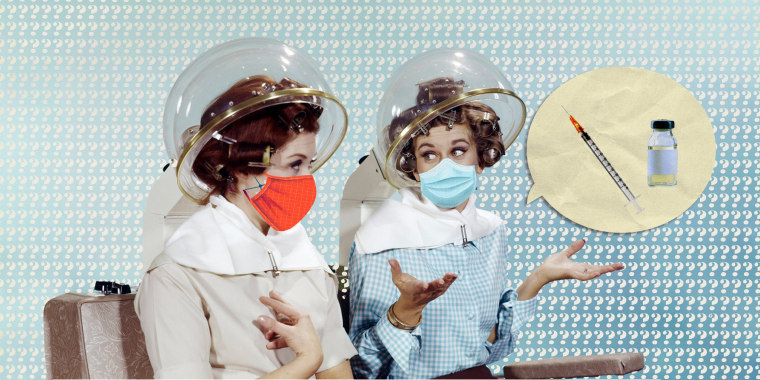As people start planning a return to "normal" life following the pandemic, there is one question to ask before visiting with friends and family: Are you vaccinated?
As vaccine eligibility continues to open up across the country, the Centers for Disease Control and Prevention (CDC) recommends that vaccinated adults continue to follow mitigation methods like masking and social distancing in public places. Though, when fully vaccinated individuals gather together, those methods can be relaxed.
How to ask someone if they received a COVID-19 vaccination:
Asking someone about their vaccination status can feel invasive, but Dr. Philip Muskin, a professor of psychiatry at Columbia University Medical Center in New York, emphasized that people should keep in mind that it's information that they may need so that they can make their own risk assessments.
Before asking, it may be worthwhile to check your friend or family member's social media accounts. Many people have been proudly posing for photos with their vaccination cards; spotting one of these posts could save you from the awkward interaction. If no proof is spotted, asking the question is important.
"When you’re lacking information you have fear and anxiety," Muskin said. "The delicacy of this does depend upon the situation, and the situation is always going to change. ... Maybe it's not casual conversation, but it's something that can be discussed."
Muskin advises that before asking, you consider two things: Why you're asking and what your relationship to the person you're speaking to is.
"Start by asking yourself why you need to have that information. It might be practical," he explained, giving the example of going over to a friend's home for dinner: You may feel much more comfortable being unmasked and indoors if they've already been vaccinated. "Knowing people's vaccine status can give us a level of comfort, but what if we don't know if they're vaccinated? It's a delicate question to ask."
If you do find yourself asking, make sure that you're considering whether it's a reasonable request: Muskin pointed out that it's more important to know someone's vaccination status if you're indoors and unmasked, as opposed to a situation where you might be outdoors and distanced. Muskin also advises that people be prepared to explain their reasoning when they ask a friend about their vaccination status.
"Prepare for their response, when you ask the question," he said. "Be prepared to say 'Well, we're going to be in a car together for an hour. Do we need to wear our masks?'"
Ariane Ling, a psychologist and clinical assistant professor at the NYU Grossman School of Medicine in New York, said that people should remember that it's "completely legitimate" to want to stay safe from the coronavirus and advises taking time to work on "assertiveness skills" that can make these conversations easier.
"It's good to share how you're feeling about something," Ling explained. "(You could say) 'We're still in this situation with COVID, and I would feel more comfortable being around people who have been vaccinated, and so therefore it's important for me to ask you, if it's OK with you, if you've been vaccinated?'"
Muskin said that you should prepare for someone to not want to share their vaccination status, but think ahead to how you want to handle that potential situation. It may mean rearranging your plans to include more precautions, or canceling them altogether if you feel strongly.
To recap, here are three simple steps to follow when approaching these conversations:
- Explain why you’re asking (you’ll be meeting indoors, kids are not vaccinated, etc.).
- In advance, consider that someone may not want to disclose this information to you.
- Come to a resolution together about whether mitigation methods need to be followed or not.
"This is information that people should feel comfortable sharing," Muskin said. "... If I had friends and they were unwilling to share their vaccine status with me, I would just say 'OK, then we won't get together.' If they think for whatever reason that that's beyond the scope of what we should be sharing, that's fine, I respect that, but we won't get together."
Related:

